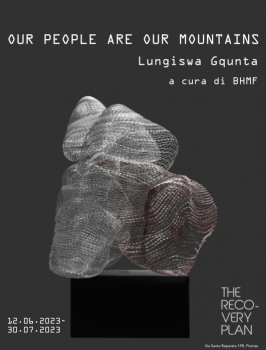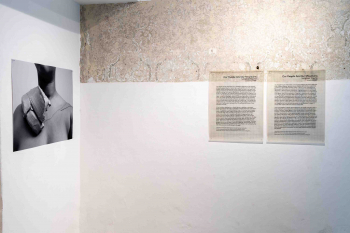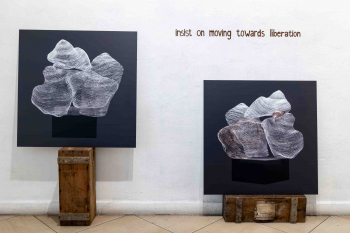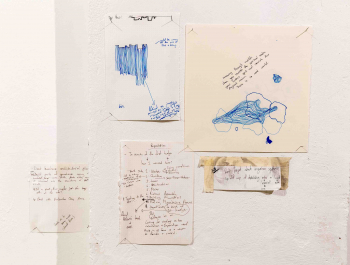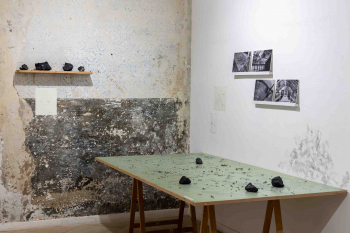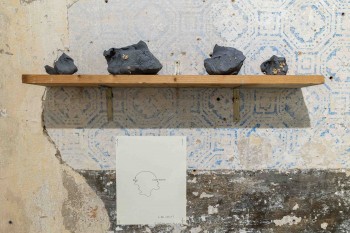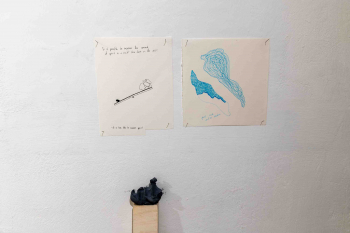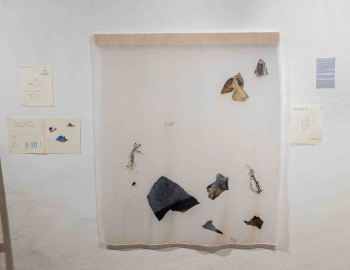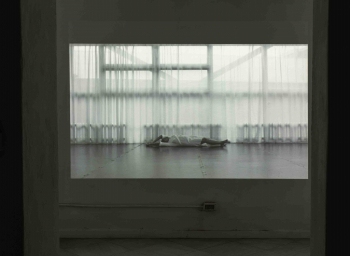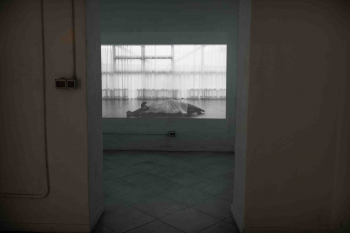Our People
Are Our Mountains
Lungiswa Gqunta
curated by BHMF
June 12-September 30
Our People Are Our Mountains1 is an exhibition dedicated to the research of artist Lungiswa Gqunta. Inspired by a quote by Bissau-Guinean and Cape Verdean activist and agronomist Amilcar Cabral, the work is an open form rebuttal of attempts at displacing ancestral land based knowledge through scientific naming, claiming and classification. The work takes the form of a studio or a laboratory as a gesture towards ongoing care and urgency in relation to the development of new languages for reclaiming earth epistemologies, as well as, meaningful relations to the socio-spirituality of the natural world. To envision people as geological features shaped by the accumulation of inherited cultural strata and historic atmospheric conditioning is to rethink the geo- logics that see the earth as a dead thing. If our people are understood as our mountains, then perhaps we can engage in time traversing forms of self-narration removed from the suffocating notions of inexhaustible resources.
It has long been deployed as a colonial device to preface a claiming of space and resources through a privileging of natural rather than cultural histories. This gesture of unseeing displaces ways of knowing. Renaming processes, (typically in Latin) integral to this practice, are too often perceived as universal rather than grounded in the history of science as a smokescreen cover, when not an outright justification, for appropriation, extraction and burial of the evidence of epistemicide. What must be discarded to make way for the inequitable redistribution and reassignment of value across a system reliant upon perceived universal rights to land? When we frame research as exclusively that which is accepted and credited as academic, what are the risks of a similar displacement of knowledge? What languages must we use in order to avoid the trappings, shortcomings and violence of over-determining a path forward that refuses to be nurtured by the trails that were intentionally buried in the past?
Biography
Lungiswa Gqunta lives and works in Cape Town. She is one of the founding members of iQhiya, with whom she participated in Documenta 14 and Glasgow International.
Her solo exhibitions include Sleep in Witness 2022, Henry Moore Foundation, Tending to the harvest of dreams 2021, ZOLLAMTMMK Museum of Modern Art,
Frankfurt; Lungiswa Gqunta 2019, Apalazzo Gallery, Brescia, Italy; Qwitha 2018, WHATIFTHEWORLD, Cape Town; Poolside Conversations 2017, Kelder Projects, London and Qokobe 2016, WHATIFTHEWORLD, Cape Town.
Group exhibitions include Ubuntu a Lucid Dream 2021, Palais de Tokyo, Paris; Living Forgiving Remembering 2020, Museum Arnheim, Netherlands; Garden of Earthly Delights 2019, Gropius Bau, Berlin and The Planetary Garden, Cultivating Coexistence, Manifesta Biennial 12, Palermo (2018).
Gqunta attended the Rijksakademie Residency, Gasworks Residency, London; Women on Aeroplanes workshop, Centre for Contemporary Art, Lagos, and the Nirox Residency, Cradle of Humankind in 2018.
